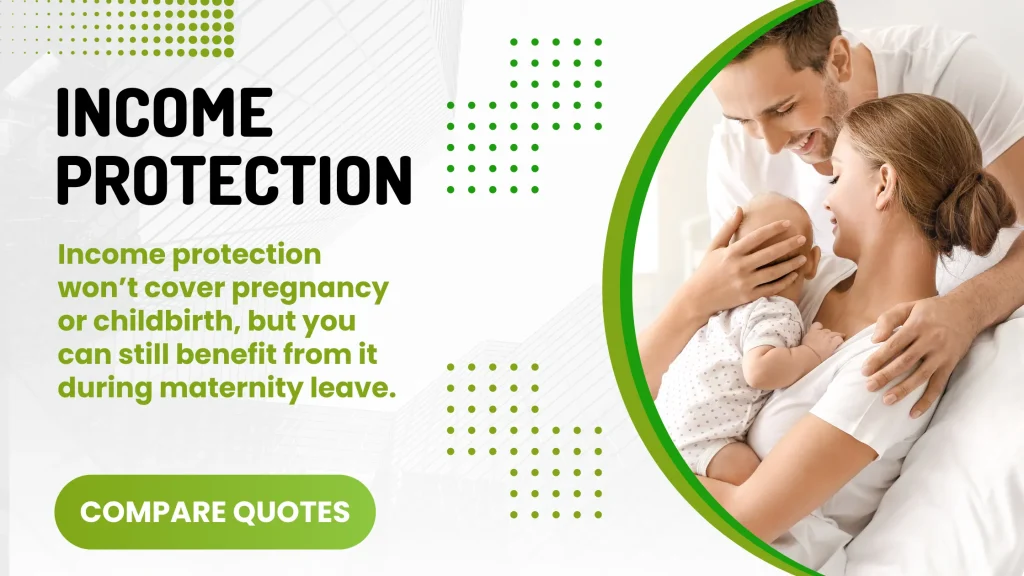
Pregnancy is often referred to as one of the most joyous times in a person’s life – for the mother due to the joys of carrying a child and for the father, the opportunity to watch a new life come into the world.
When it comes to pregnancy and occupation, there is usually a time right before the birth of the child and a few weeks after that, during which the mother does not work and instead stays home to care for and bond with the child.
During this time, not many people think about their income protection insurance and whether or not it will cover them during the weeks after the baby has been born.
Income protection insurance partly compensates for a loss of earnings that the policyholder may experience to support themselves and their dependents.
Generally, these policies help cover loss of earnings due to an unforeseen event, such as an accident, injury, or sudden illness that would leave the policyholder unable to work.
When it comes to income protection policies and pregnancy, it is evident that pregnancy is not an “unforeseen event” in which income protection would kick in to help pay expenses related to being unable to work.
As we all should know, pregnancy is most commonly planned and is more predictable than falling off a ladder or being diagnosed with a debilitating illness.
Click To Compare QuotesBecause of this, many income protection policies list exceptions for what does not qualify a policyholder to make a successful claim.
The exceptions section contains common headings like “childbirth” or “pregnancy” to indicate that claims cannot be made on such events.
These headings usually can be found with other common headings like pre-existing conditions, self-inflicted injuries, and alcohol abuse.
Is Maternity Leave Excluded from Income Protection Policies
Although the vocabulary “childbirth” and “pregnancy” are included in the exclusions of most policies, there is an argument that pregnancy is the time leading up to the birth of the child and that childbirth is the act of giving birth to the child.
That said, since “maternity leave” is the time after the child is born, many argue that it could be covered under an income protection policy.
Unfortunately, even though this may be true in most cases, the insurance company views childbirth, pregnancy, and maternity leave as the same and excludes them.
Maternity leave is often recognized as different from childbirth or pregnancy, as it is the time after the child is born that it needs to be cared for.
However, maternity leave does not mean a policyholder cannot work or should be considered incapacitated.
This is because the mother is still physically and mentally able to return to work and has temporarily relinquished her occupation during this specific period.
Although income protection doesn’t cover pregnancy or childbirth, the policy may offer support during maternity leave.
Some policies provide payouts if you experience an illness or injury unrelated to pregnancy or childbirth while on leave.
Additionally, your policy may include other features that could be beneficial during this period.
However, not all insurers offer these options, so it’s essential to review the policy terms carefully to understand what’s included.
By securing cover through a broker like Claybrooke, you can get answers to any questions and find policies tailored to your needs.
If you want to expand your family and ensure your policy offers such benefits, our team can help you find the right coverage and provide you with fee-free quotes.
Feel free to reach out for more information.
In summary
Nothing about pregnancy, childbirth, or maternity leave prevents a policyholder from returning to work.
With this in mind, it is easy to understand that any income protection policy the policyholder may have will be temporarily held or suspended while on maternity leave.
Click To Compare QuotesAt this time, the policyholder is recognised as still able to contribute to the family and the usual means of employment after the maternity leave period has ended, so she does not need the financial assistance that an income protection policy would provide.
Policyholders should not expect to have a claim honoured or have their income protection policy pay them benefits during maternity leave.
The income protection industry is particular about what will not qualify as a claim-worthy event.
The exclusions are clearly outlined in almost all income protection policy terms and conditions. In many cases, pregnancy, childbirth, and maternity leave are all excluded from being protected under the policy.
Since this is not a reliable source of income during maternity leave, expectant parents should financially plan if the primary breadwinner will not be working for a while.
Some employers offer paid maternity leave, so it is essential to check with the human resources department at a given company for more details.
